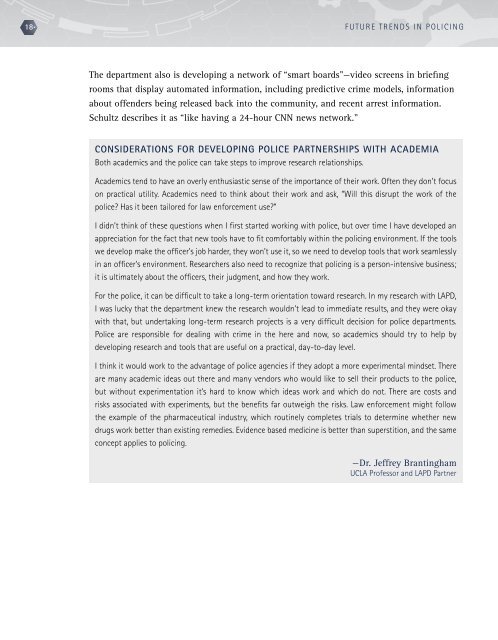future trends in policing 2014
Create successful ePaper yourself
Turn your PDF publications into a flip-book with our unique Google optimized e-Paper software.
18<br />
FUTURE TRENDS IN POLICING<br />
The department also is develop<strong>in</strong>g a network of “smart boards”—video screens <strong>in</strong> brief<strong>in</strong>g<br />
rooms that display automated <strong>in</strong>formation, <strong>in</strong>clud<strong>in</strong>g predictive crime models, <strong>in</strong>formation<br />
about offenders be<strong>in</strong>g released back <strong>in</strong>to the community, and recent arrest <strong>in</strong>formation.<br />
Schultz describes it as “like hav<strong>in</strong>g a 24-hour CNN news network.”<br />
CONSIDERATIONS FOR DEVELOPING POLICE PARTNERSHIPS WITH ACADEMIA<br />
Both academics and the police can take steps to improve research relationships.<br />
Academics tend to have an overly enthusiastic sense of the importance of their work. Often they don’t focus<br />
on practical utility. Academics need to th<strong>in</strong>k about their work and ask, “Will this disrupt the work of the<br />
police? Has it been tailored for law enforcement use?”<br />
I didn’t th<strong>in</strong>k of these questions when I first started work<strong>in</strong>g with police, but over time I have developed an<br />
appreciation for the fact that new tools have to fit comfortably with<strong>in</strong> the polic<strong>in</strong>g environment. If the tools<br />
we develop make the officer’s job harder, they won’t use it, so we need to develop tools that work seamlessly<br />
<strong>in</strong> an officer’s environment. Researchers also need to recognize that polic<strong>in</strong>g is a person-<strong>in</strong>tensive bus<strong>in</strong>ess;<br />
it is ultimately about the officers, their judgment, and how they work.<br />
For the police, it can be difficult to take a long-term orientation toward research. In my research with LAPD,<br />
I was lucky that the department knew the research wouldn’t lead to immediate results, and they were okay<br />
with that, but undertak<strong>in</strong>g long-term research projects is a very difficult decision for police departments.<br />
Police are responsible for deal<strong>in</strong>g with crime <strong>in</strong> the here and now, so academics should try to help by<br />
develop<strong>in</strong>g research and tools that are useful on a practical, day-to-day level.<br />
I th<strong>in</strong>k it would work to the advantage of police agencies if they adopt a more experimental m<strong>in</strong>dset. There<br />
are many academic ideas out there and many vendors who would like to sell their products to the police,<br />
but without experimentation it’s hard to know which ideas work and which do not. There are costs and<br />
risks associated with experiments, but the benefits far outweigh the risks. Law enforcement might follow<br />
the example of the pharmaceutical <strong>in</strong>dustry, which rout<strong>in</strong>ely completes trials to determ<strong>in</strong>e whether new<br />
drugs work better than exist<strong>in</strong>g remedies. Evidence based medic<strong>in</strong>e is better than superstition, and the same<br />
concept applies to polic<strong>in</strong>g.<br />
—Dr. Jeffrey Brant<strong>in</strong>gham<br />
UCLA Professor and LAPD Partner


